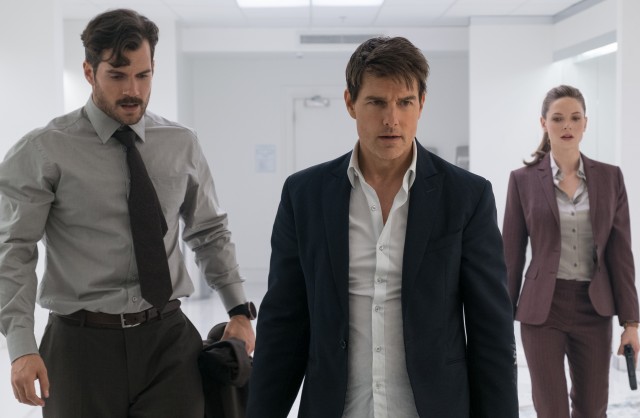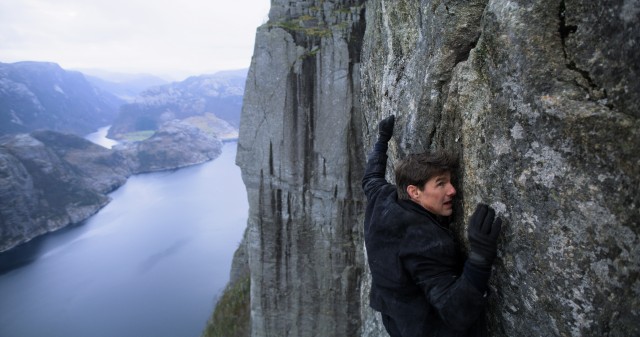Mission: Impossible - Fallout Movie Review
 |
Mission: Impossible - Fallout
Theatrical Release: July 27, 2018 / Running Time: 147 Minutes / Rating: PG-13 Director: Christopher McQuarrie / Writers: Christopher McQuarrie (screenplay), Bruce Geller (television series) Cast: Tom Cruise (Ethan Hunt), Henry Cavill (August Walker), Ving Rhames (Luther Stickell), Simon Pegg (Benji Dunn), Rebecca Ferguson (Ilsa Faust), Sean Harris (Solomon Lane), Angela Bassett (Erica Sloan), Vanessa Kirby (White Widow), Michelle Monaghan (Julia Meade-Hunt), Wes Bentley (Patrick), Frederick Schmidt (Zola), Alec Baldwin (Alan Huntley), Liang Yang (Lark Decoy), Kristoffer Joner (Nils Debruuk), Wolf Blitzer (Wolf Blitzer) |
It's been 32 years since Tom Cruise first starred in a box office champion. Somewhere since then, Cruise ceased to be the biggest movie star in the world. The days in which Cruise's presence alone was enough to guarantee a $100 million gross in any wide release have passed. Nowhere has Cruise's ability to draw crowds been more consistent and enduring than in the Mission: Impossible franchise. Launched in 1996, a year that would see Cruise star in the third and fourth biggest blockbusters of the year (the latter being the R-rated romantic dramedy Jerry Maguire), the M:I films soon took on a life of their own, eclipsing the 1960s television series they were based on in familiarity and relevance. Though it ran for seven seasons and nearly two hundred episodes, that old TV series isn't getting anywhere close to the top of Google results for "Mission Impossible" searches anytime soon.
The action film franchise, Cruise's first and only outside of forgettable Reacher, seemed to reach a logical conclusion after the third installment, released in May 2006 (i.e. one year after his infamous Oprah couch jumping), set series lows commercially, even with "Lost" creator J.J. Abrams taking the helm and garnering better reviews than the first two. Instead of ending there, Cruise kept going. Rather than registering as the beating of a dead horse, 2011's fourth installment Mission: Impossible - Ghost Protocol, directed by Brad Bird, became a critical and commercial triumph. If Cruise's other new movies don't captivate the public like they used to -- and they largely haven't -- then there is now this improbably long-legged series to fall back on.
Mission: Impossible - Fallout is the sixth entry to the universe and the second in a row written and directed by Christopher McQuarrie, a filmmaker whose career has been inseparable from Cruise's since he wrote and produced 2008's Valkyrie.
Of course, Cruise is front and center once again, both as a hands-on producer and as the protagonist Ethan Hunt. Hunt, an agent for the top-secret Impossible Missions Force (IMF), is no stranger to death-defying, world-saving antics, having performed them again and again with virtually no room for error. By his side this outing are the tech expert Benji Dunn (Simon Pegg) and the burly Luther Stickell (Ving Rhames). (Jeremy Renner's field operations director is as a no-show this time.)
After a haunting opening scene, in which Hunt dreams of his largely-forgotten love interest/wife (Michelle Monaghan) and of Solomon Lane (Sean Harris), the villain who put the "rogue" in Rogue Nation, Hunt gets his latest assignment. Dangerous fanatics called The Apostles and their elusive unknown leader are plotting a nuclear attack. When three potent plutonium shells slip out of Hunt and associate's hands, the world seems doomed. But not all is as it seems, not even if Wolf Blitzer reports it.
While the plan is thwarted, the terrorist group still remains a threat and Hunt is enlisted to stop them. Given the IMF's spotty track record, the new director of the CIA (Angela Bassett) insists that Hunt's actions are assisted and monitored by Special Activities Division assassin August Walker (Henry Cavill, better known as the present Superman). Walker eyes Hunt suspiciously and eventually even IMF Secretary Alan Hunley (Alec Baldwin, returning) has doubts about his star agent's allegiances.
To further detail the plot would be a pointless exercise because these movies are less enjoyed for the stories they tell than the rides they take you on. I will say that the mission does come to involve former MI6 agent Ilsa Faust (Rebecca Ferguson, back for a second go); the aforementioned securely imprisoned Lane, who is now as vengeful as he is maniacal; and the White Widow (Vanessa Kirby), who is apparently the daughter of Vanessa Redgrave's character from the very original film, should you remember that far back.
Like the two installments before it, Fallout succeeds with inspired and skillful action. Seven years removed, Ghost Protocol seems undoubtedly a franchise reviver, much like 2009's Fast and Furious salvaged that lucrative Universal action series. Where possible, the team opts for stunning real/practical visual effects, putting Cruise back in danger atop skyscrapers and dangling from helicopters. Digital illusions are hard to spot and usually present only in established conceits, like the IMF's ability to make a remarkably convincing mask of anybody's face in mere minutes. Once again, Cruise is all in, driving a motorcycle through traffic in Paris, hanging off a cliff in Kashmir, and participating in an intense bathroom brawl full of shattered glass and porcelain. There is something truly comforting, with all the change that occurs in the world and in our lives, to see Cruise still doing what he does: running on rooftops and dodging bullets while still more variations upon Lalo Schifrin's old TV series theme play (this time courtesy of composer Lorne Balfe).
There is pretty much no opportunity for a Mission: Impossible to be received as great cinema or high art, but there is a lot of opportunity for it to be received as tired cash grabs nobody wants (a.k.a. the latest Pirates of the Caribbean). Somehow, six movies in, Fallout avoids that designation. The thrills remain exciting. The protocols, though familiar, remain fun. Cruise's straight-faced shtick through breathless stunts maintains its appeal. The biggest knock on the film is simply that there is too much of it. There's a fifteen minute countdown that seems to unfold for at least a half-hour and though it is pretty compelling stuff -- helicopters amidst snowy mountains, sweat-dripping wire-cutting, hostage situations -- it is just more than we need, having already endured two hours of high quality action cinema by this point.
But no one can really begrudge for Cruise et al. for doing what they clearly love and are well-suited for. In a summer where eight of last weekend's top nine earners were sequels, Fallout isn't exactly novel or original, but the evident passion it continues to pour into a series that seemed done twelve years ago is impressive and commendable. Continuing to raise the bar with its sharp new takes on old school action while its star defies the aging process, there is no reason to think we won't keep getting a new one of these every few years for another decade or two and somehow that doesn't sound like a bad idea at all.
|
Related Reviews:
DVDizzy.com | DVD and Blu-ray Reviews | New and Upcoming DVD & Blu-ray Schedule | Upcoming Cover Art | Search This Site
DVDizzy.com Top Stories:
Mission: Impossible - Rogue Nation • Mission: Impossible - Ghost Protocol
Now in Theaters: Ant-Man and the Wasp • Skyscraper • Teen Titans Go! To the Movies • Incredibles 2 • The Equalizer 2
Tom Cruise: Jack Reacher: Never Go Back • The Mummy • Vanilla Sky • American Made • Top Gun • Oblivion
Written by Christopher McQuarrie: Jack Reacher • Edge of Tomorrow • The Usual Suspects • Jack the Giant Slayer • The Tourist
Henry Cavill: The Man from U.N.C.L.E. • Batman v Superman: Dawn of Justice • Man of Steel • Justice League • Stardust
Text copyright 2018 DVDizzy.com. Images copyright 2018 Paramount Pictures, Skydance Productions, and Bad Robot.
Unauthorized reproduction prohibited.

